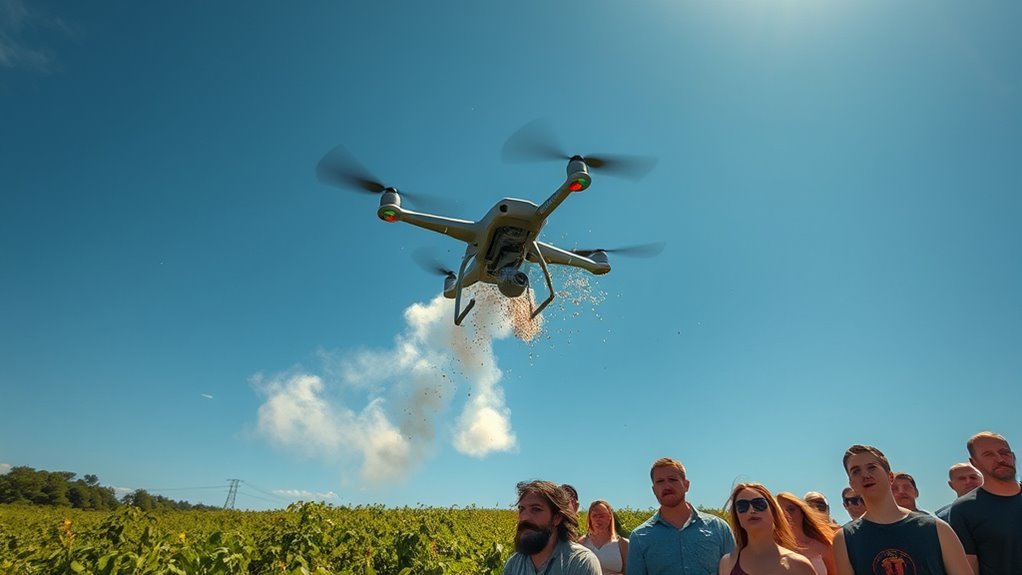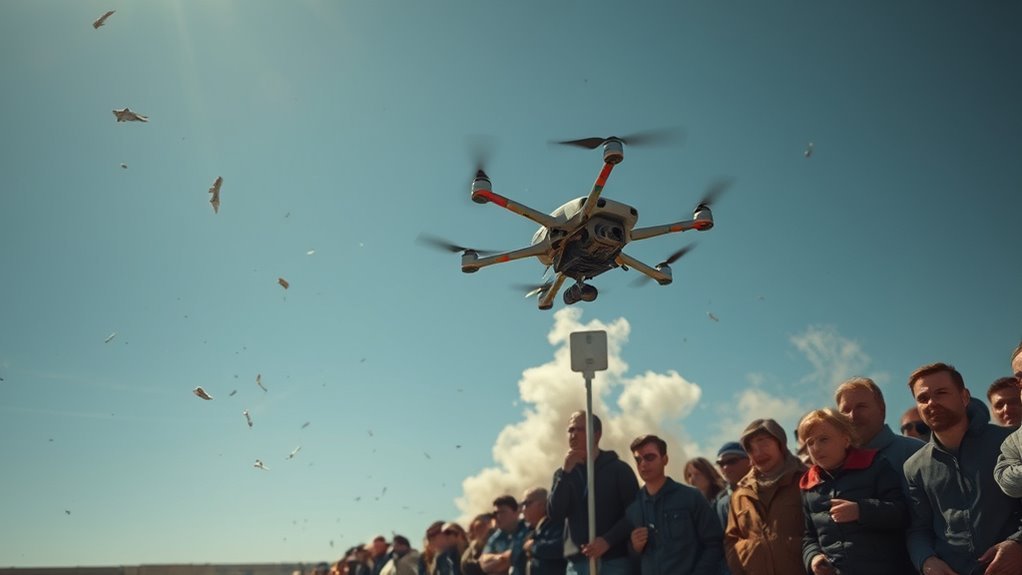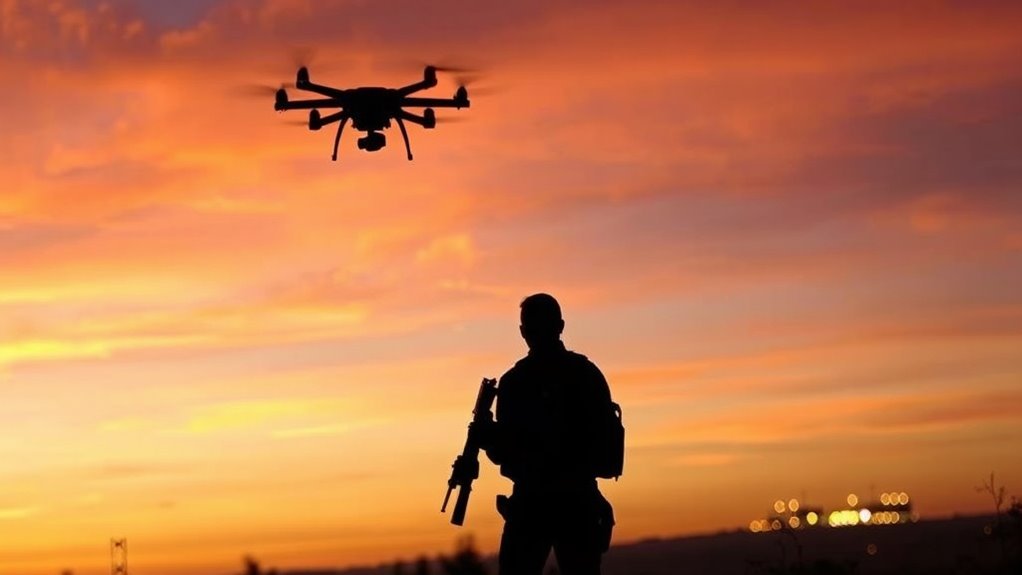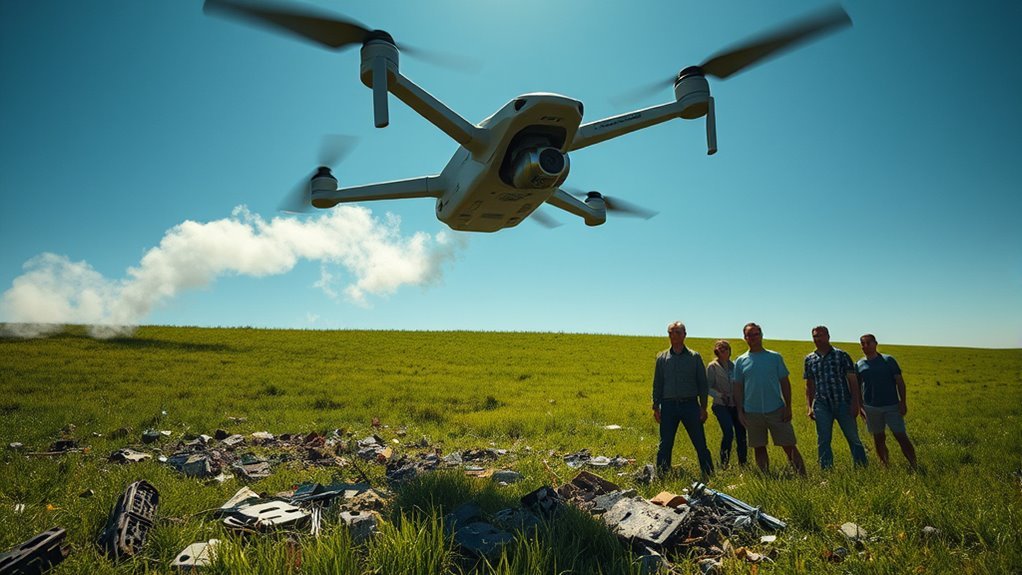If you shoot down a drone, you could face serious legal trouble since drones are federally protected aircraft; doing so might result in criminal charges, hefty fines, or civil lawsuits for property damage. Beyond legality, disabling a drone risks injury from falling debris and can disrupt important communications. It’s critical to contemplate safer, lawful alternatives to address drone concerns. Understanding these complexities reveals why shooting down a drone is rarely a straightforward solution.
Legal Implications of Shooting Down a Drone

Although you might feel justified in shooting down a drone that invades your privacy or property, it’s important to understand that doing so can have serious legal consequences. The concept of self defense justification rarely extends to drones, as the law typically prioritizes drone ownership rights and federal regulations. Drones are considered aircraft under FAA jurisdiction, making their destruction potentially a federal offense. Even if a drone is trespassing, your response must be proportional and lawful. Unauthorized interference can lead to criminal charges, civil liability, or both. While protecting your freedoms is crucial, exercising restraint and understanding the legal framework surrounding drone incursions is essential. You should explore alternative legal remedies rather than resorting to destructive actions that could jeopardize your rights and result in significant penalties.
Safety Risks Associated With Disabling Drones

When you disable a drone, you introduce several safety risks that must be carefully considered. Disabling methods—whether physical or electronic—can cause uncontrolled crashes, posing hazards to people, property, and infrastructure below. Conducting a thorough risk assessment is essential to evaluate potential collateral damage. You should factor in the drone’s altitude, speed, and location relative to populated areas. Additionally, interfering with drone operations might disrupt emergency services or critical communications relying on unmanned aerial systems. Maintaining drone safety requires balancing your desire for freedom with responsible actions that minimize unintended harm. Before attempting to disable a drone, assess whether the risks outweigh the benefits and consider alternative measures that preserve both your safety and freedom without escalating danger.
Potential Criminal Charges and Penalties

If you shoot down a drone, you could face serious legal consequences, including criminal charges and civil liability for property damage. The applicable laws vary markedly between federal and state jurisdictions, making it essential to understand which regulations apply to your situation. Ignoring these distinctions can lead to penalties ranging from fines to imprisonment.
Legal Consequences Overview
Since drones are protected under various federal and state laws, shooting one down can expose you to serious legal consequences. Understanding these is vital if you value your freedom and want to navigate drone regulations effectively. The legal system can impose:
- Criminal charges including destruction of government or private property
- Fines that may reach tens of thousands of dollars
- Possible imprisonment depending on jurisdiction and circumstances
- Civil suits filed by drone owners seeking damages
- Challenges in mounting a legal defense due to strict liability standards
You must recognize that drone regulations prioritize privacy and safety, limiting your ability to take direct action against drones. Ignoring these rules can undermine your legal defense and expose you to severe penalties. Staying informed and compliant is your best protection.
Property Damage Liability
Although you might feel justified in disabling a drone that invades your property, doing so exposes you to significant property damage liability under federal and state laws. When you shoot down a drone, you become responsible for any resulting damage, which may include costly repairs or replacement. Insurance coverage often excludes intentional acts, leaving you financially vulnerable. A thorough damage assessment will determine your liability and potential claims from the drone operator. Additionally, property damage liability can trigger civil lawsuits, requiring you to prove just cause—an often difficult standard. Understanding these risks is essential for anyone valuing personal freedom and property rights. Acting impulsively without considering legal and financial consequences undermines your protection and may result in penalties far outweighing the perceived benefit of disabling the drone.
Federal vs. State Laws
Beyond the financial risks tied to property damage, shooting down a drone can expose you to serious criminal consequences under both federal and state laws. Federal regulations strictly prohibit interfering with aircraft, including drones, imposing severe penalties. Meanwhile, state statutes vary widely, with some states criminalizing drone destruction explicitly and others applying general property or weapons laws. You should consider:
- Violations of FAA rules can lead to felony charges.
- State laws might include misdemeanors or felonies depending on intent and damage.
- Penalties range from fines to imprisonment.
- Some states require proof of malicious intent.
- Defenses are limited under federal regulations.
Understanding the intersection of federal regulations and diverse state statutes is vital before taking any action against a drone to avoid unintended legal consequences.
Damage Liability and Financial Consequences
When you shoot down a drone, you could be held financially responsible for the damage caused. This liability extends beyond the physical destruction of the drone to potential losses incurred by the owner. Your insurance coverage may not protect against intentional damage to another’s property, exposing you to out-of-pocket expenses. Compensation claims can be filed by the drone owner seeking reimbursement for repairs or replacement costs. In some cases, additional damages for lost data or interrupted business operations might be pursued. It’s critical to understand that even if you believe your actions are justified, the legal system often prioritizes property rights, making you liable. Evaluating these financial consequences carefully is essential before taking any action against a drone infringing on your space.
Alternative Methods to Handle Unwanted Drones
Anyone facing an unwanted drone overhead should consider non-destructive alternatives before resorting to shooting it down. Employing effective drone deterrents and conflict resolution strategies preserves your freedom while minimizing legal risk. You can:
Consider non-destructive drone deterrents first to protect your space responsibly and avoid legal issues.
- Use signal jammers designed to disrupt drone control frequencies.
- Deploy physical barriers such as net guns to capture drones safely.
- Implement geo-fencing technology to restrict drone flight zones.
- Engage drone operators directly to resolve conflicts amicably.
- Utilize professional counter-drone services equipped with radar and detection systems.
These methods emphasize precision and control, allowing you to protect your space responsibly. Opting for alternative interventions respects property rights and reduces liability, ensuring that your actions align with legal frameworks and ethical standards in drone management.
Privacy Concerns and Ethical Considerations
While alternative methods offer controlled ways to address unwanted drones, they also raise significant privacy and ethical questions. When you consider surveillance ethics, you must balance the legitimate need for monitoring with respect for personal autonomy. Using countermeasures like signal jamming or capture devices can inadvertently infringe on your privacy or that of others, potentially escalating conflicts. You should be aware that interfering with drones implicates legal frameworks designed to protect both property rights and individual freedoms. Ethically, you face the challenge of preventing unauthorized surveillance without violating rights yourself. Maintaining this balance is essential if you want to uphold personal autonomy while addressing privacy concerns effectively. Ultimately, your actions should reflect a careful assessment of risk, legality, and respect for the evolving norms around drone use and surveillance.

